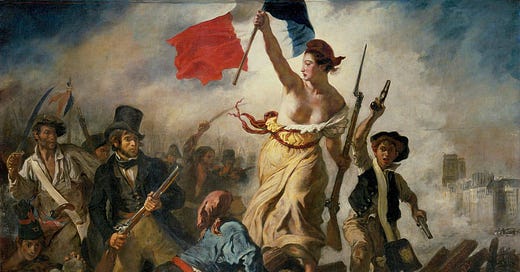The Algebra of Revolution: Enlightenment Philosophy Fails Us Once Again
My post-election thoughts...
By education, I’m a political scientist, which means I’ve sat through my fair share of political theory classes, which are more about reading than they are about understanding. The main test of these classes was to regurgitate to the professor what the enlightenment philosophers said, which is honestly more difficult than it sounds.
Hobbes, Locke, Rousseau, Hume, Voltaire. They all argued with each other ad-nauseam, but at the end of the day they all agreed on a very important principle: human nature is static and universal and the progression and development of a society is dependent on the ideas and education of it’s influencing members. “The rational mind can renovate an irrational world” (Rees, “The Algebra of Revolution”).
In other words we move from one historical era to the next because we have good or bad ideas that shape our world, but our true nature remains the same. Now, they argued about what that nature was, or which ideas were good or bad constantly, but the foundation of the thought was still the same.
Why is it then, so clear in recent years that bad politics and bad information can’t be debated, out-reasoned, or vanquished by a clever maneuver, like a well-placed rook on a chess-board?
There’s a modern-day phenomenon called “The Death of Expertise” which describes our society’s tendency to learn from charismatic individuals as opposed to those who possess knowledge on the subjects at hand. This is a narrow, uniquely American, and meritocratic critique of the problem in my opinion, but overall gestures at the incorrectness of enlightenment thought.
An Enlightenment Philosopher (that we did not read in my political theory class), Georg Wilhelm Friedrich Hegel challenged the underlying premise of these other enlightenment philosophers.
He argued that human nature as well as the formulations of art, science and the institutions of the state and its codes, laws and norms were all defined by their history and could only be understood by examining their historical development. Hegel’s philosophical thought saw cultural and political development as an expression of a specific culture rather than an eternal truth.
The implication of Hegel's philosophy was that every social order, no matter how powerful and secure, will eventually wither away, because it can’t be thought into or out of existence. Instead, social orders are a chaotic amalgam of historical intersectionalities and experiences that meld together and entangle the very concepts of truth, justice, and progress.
The unraveling of these ideas was very inspirational to a young Karl Marx who elucidated on Hegel’s historicism to bring us the concept of historical materialism; the idea that the economic structure of a society, or "mode of production," is the primary driving force behind social change. All other aspects of society, like politics, culture, and ideas, are ultimately shaped by the material aspects of human labor, or the way that goods and services are produced.
I feel that in no other era of my life has this theory felt so true to me. Disinformation, social decay, and the dictatorship of economics in our country’s political thought has reared it’s ugly head in a tidal wave of grifting, greed, and vitriol with this latest election.
As I’ve taken the month of November to process these thoughts, I feel that it has only gotten worse and even more apparent. When success in our workplace looks like dictatorship, why would our society value democracy?






